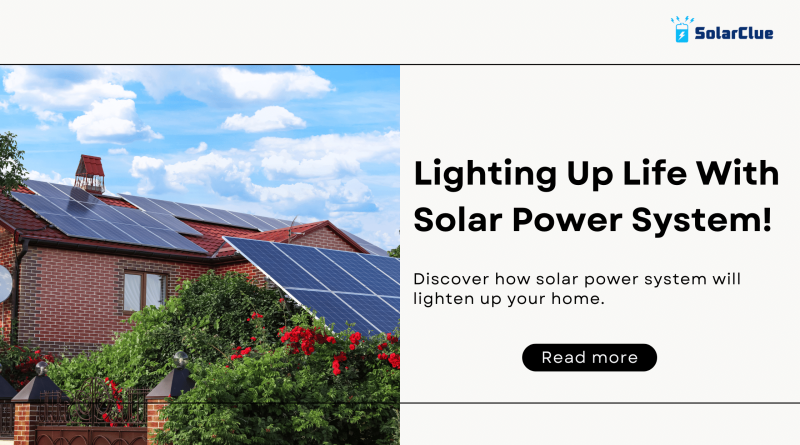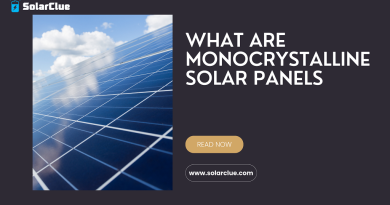Lighting Up Your Life With Solar Power System for Your Home
In the era of sustainable living, solar power systems have become a beacon of promise for households seeking eco-friendly and cost-effective energy solutions. Let’s delve into the illuminating world of solar energy and discover how integrating a solar power system into your home can light up your life.
Table of Contents
Understanding Solar Power Systems
Solar Power System for home essentially help in many ways. Let’s look to understand more about it:
How do solar panels function?
By harnessing the photovoltaic phenomenon, solar panels, or photovoltaic cells, actively convert sunlight into electrical energy. When solar radiation strikes the cells, it dislodges electrons, creating an electrical current. Inverters play a key role, transforming the generated direct current (DC) into alternating current (AC) for effective utilization in residential settings.
Classification of Solar Power Systems
Solar power systems, categorized as grid-tied, off-grid, and hybrid systems, actively play a role in generating energy. Grid-tied systems connect to the local utility grid, efficiently returning and selling surplus energy. Off-grid systems, on the other hand, operate independently, relying on batteries for energy storage. Hybrid systems strategically combine the most advantageous aspects of two distinct domains.
Benefits of Solar Power Systems
Solar power systems provide a multitude of benefits, such as decreased electricity expenses, diminished environmental impact, enhanced energy self-sufficiency, and augmented real estate valuation. Furthermore, recent technological breakthroughs have significantly enhanced the efficiency and affordability of solar panels, surpassing any previous achievements in this domain.
Selecting an Appropriate Solar Power System for Your Home
Evaluating Your Energy Requirements
The initial phase is determining one’s energy requirements. Conduct an analysis of your monthly electricity consumption in order to accurately determine the appropriate sizing for your solar power installation. It is important to take into account several aspects, such as the number of peak solar hours available in a certain place and the prevailing weather patterns while considering a particular situation.
Choosing the Appropriate Solar Panels (Photovoltaic Panels)
Solar panels are available in a range of forms and efficiency. Monocrystalline solar panels are characterised by their space efficiency, but polycrystalline solar panels are known for their affordability. Thin-film panels include characteristics of flexibility and lightness, rendering them well-suited for utilisation in non-traditional areas.
Inverter and Battery Options
Inverters actively facilitate the conversion of direct current (DC) into alternating current (AC), ensuring compatibility between the generated electricity and various household equipment. Batteries play a crucial role in storing surplus energy, ready for use in situations characterized by reduced solar irradiation or electrical grid failures. The notable efficiency and extended operational longevity of lithium-ion batteries have contributed significantly to their widespread popularity.
Step-by-Step Guide to the Installation Process of Solar Power System
The process of evaluating a specific location or site to determine its suitability for a particular purpose or activity.

Site Assessment
A thorough evaluation of the property will be conducted by a qualified specialist, taking into account several criteria such as the pitch of the roof, the presence of shadowing, and the overall structural soundness. The assessment of panel placement is of utmost importance for achieving the best outcomes.
Solar Panel Installation
Specialised racks are utilised to put solar panels either on the roof or on the ground. Ensuring proper installation is crucial in order to optimise sunlight exposure to its fullest extent. The panels are joined in order to form an array.
Setup of an inverter and battery system
The installation of inverters and batteries enables the system to effectively convert and store energy. The inspection of wiring and connections is conducted in order to mitigate any electrical problems. The process of establishing a connection to the electrical grid.
Connecting to the Grid
In grid-tied systems, a trained electrician typically connects your solar power system to the local grid. This procedure enables the implementation of net metering, where surplus energy is transmitted back to the power grid, compensating for your electrical expenses.
Maintenance and Care
Regular Cleaning and Inspection
Regular cleaning and inspections are crucial maintenance routines that should be carried out consistently.
Ensuring the regular cleaning of solar panels is vital to maximize their exposure to sunlight. Identifying faults early through professional inspections helps prevent potential system failures. The creation of cleaning schedules depends on the current weather conditions in a specific area.
Addressing Common Challenges
Potential challenges such as decreased efficiency or electrical malfunctions may occur. Seeking professional assistance is crucial. Frequently encountered issues encompass inverter malfunctions, inadequate electrical connections, and the occurrence of shade complications arising from the proximity of newly constructed buildings.
Financial Considerations
Cost of Solar Power Systems
The cost is contingent upon factors such as the magnitude of the system, the calibre of its components, and the intricacy of its installation. Although the initial expenditure may appear substantial, the long-term cost reductions and incentives associated with solar electricity render it a financially prudent decision.
Government Incentives and Rebates
Numerous governmental bodies provide incentives, tax credits, and rebates as a means of encouraging the adoption of solar power systems. Conduct a comprehensive investigation into local policies in order to optimise one’s savings. These incentives have a substantial impact on reducing the overall cost.
Return on Investment (ROI)
The Return on Investment (ROI) is a financial metric that is employed to assess the profitability of an investment. The calculation involves dividing the net return derived from the investment by the initial cost of the investment and afterwards representing the result as a ratio.
The calculation of return on investment (ROI) aids in understanding the duration during which a system will recover its expenses. When assessing the advantages of adopting energy-conservation strategies, it is crucial to consider the potential for energy reduction, the availability of incentives, and the potential influence on property valuation. Solar power systems generally have a return on investment (ROI) duration that typically falls within the range of 5 to 7 years.
Environmental Impact of Solar Power
The present discourse aims to explore and analyse the environmental implications associated with the utilisation of solar power as a renewable energy source.
In addition to individual advantages, solar electricity has a substantial impact on the reduction of one’s carbon footprint. By opting for renewable energy sources, individuals actively contribute to the global effort to mitigate climate change, thereby fostering a more sustainable and habitable planet for future generations.
Conclusion
Embracing solar electricity is more than just a practical choice; it’s a moral obligation to safeguard our environment. Solar power systems stand out as the ideal alternative for modern homes, offering both environmental benefits and the promise of significant long-term economic gains. As technology continues to advance, solar power will undoubtedly play a pivotal role in steering the course of the energy sector. Don’t wait – secure a Solar Power System for your Home today!
Why Select Solarclue® as the Preferred Provider for Solar Power Solutions?
At Solarclue®, we possess a comprehensive understanding of the profound and revolutionary potential inherent in solar energy. Our team of highly skilled professionals is committed to delivering customised solar solutions for residential properties. There are several reasons why it is advantageous to select our services:
Proficiency: Drawing upon extensive experience, we possess the requisite expertise to conceive and implement highly efficient solar power systems that are customised to meet your specific requirements.
Superior Components: We procure solar panels, inverters, and batteries of exceptional quality, thereby guaranteeing the durability and efficiency of your system.
Customer Support: Our customer support team is readily accessible to provide assistance throughout the entire process, encompassing the initial consultation phase as well as post-installation maintenance. You can call us on this number: 088844 44830
Cost-effectiveness: Our company provides reasonable pricing and flexible financing alternatives, thereby enhancing the accessibility of solar electricity for homes with diverse financial capacities.
Assured pleasure: Ensuring customer pleasure is our utmost focus. Our company ensures the provision of high-quality service and dependable solar solutions that surpass the anticipated level of satisfaction.
Transition to solar power for your home today and become a participant in the ongoing movement towards sustainable energy by getting your solar power system from Solarclue®.
Frequently Asked Questions
Savings are dependent on variables such as energy consumption, system scale, and local incentives. On average, homeowners can reduce their electricity expenditures by 20 to 50 per cent.
Yes, if you have a battery storage system, your solar panels can provide power during blackouts, ensuring the continued operation of your essential appliances.
Installation time varies depending on the size and complexity of the system. On average, residential installations take between one and three days.
Solar panels require little upkeep. Professional cleaning and periodic inspections assure optimal performance.
Although it is conceivable, it is strongly advised to hire professionals. They have the knowledge and skills necessary to ensure a safe and efficient installation that adheres to local regulations.
Yes, solar panels can still produce electricity in chilly and cloudy conditions, albeit at a diminished rate.
If your inverter has spare capacity, solar power systems can usually be expanded or reduced without difficulty to accommodate fluctuating energy requirements.
A solar energy consultant can evaluate the sunlight exposure, shading, and structural integrity of your property to determine its suitability for solar installation.
Yes, solar panels can increase the value of your home. Solar-powered homes are frequently more appealing to purchasers due to their lower energy costs.
Yes, many businesses offer financing options, such as solar leases and power purchase agreements (PPAs), which make solar installations more accessible to homeowners.


